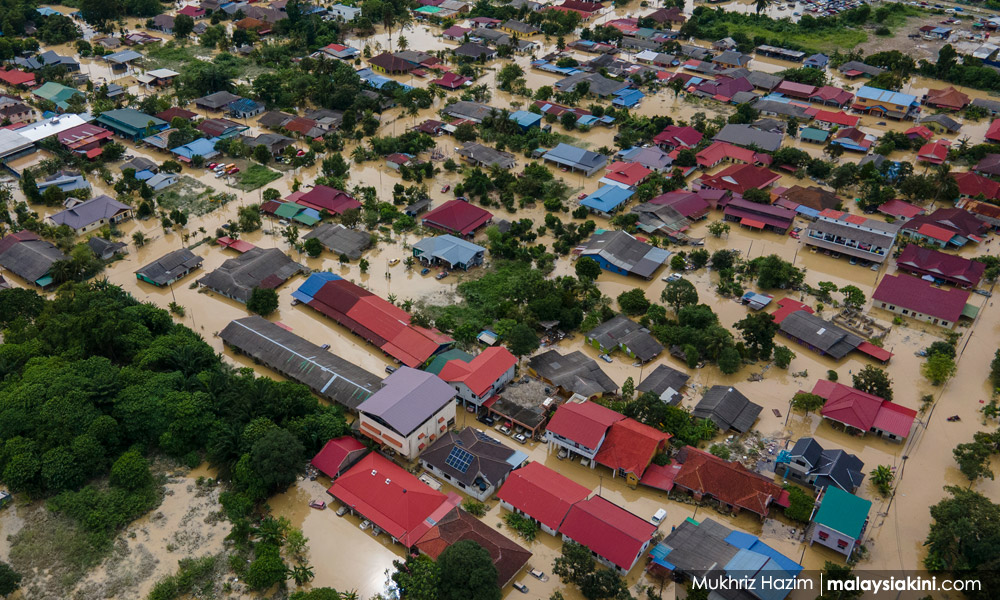When Siti Ramlah finally made it to dry land, she was already breaking down in tears. Small loaves of bread were the first meal she and her family would have in almost three days.
Other residents in Taman Sri Muda, the worst-hit area of the flood, broke into nearby stores like 99 Speedmart, Mydin Mart, KK Super Mart, and 7-Eleven for food and drinks. The bottom half of their bodies has been submerged underwater for days as the flood has taken at least one storey of most houses in the town.
Another resident, Megala Murthi, was especially frustrated. After saving 30 residents, who consist of the old and immobile, she shouted through the nights for food with the stranded victims to no avail. No Fire and Rescue Department, no army, not even the police next door came out to help.
“Only the public came to help… public boats, private boats and a few NGOs,” she said, almost losing her voice.
“They ended up getting about 10 packets of nasi lemak at the end of the day (for seven families) and today we managed to come out.”
Harrowing experience
Most of them could not understand what took so long for rescue to arrive. Thinesh, a 28-year-old resident, had to swim through the waters alone to get a boat to save his old grandmother.
“The uniformed units only arrived at 6am (two days later). We were stuck in here for two days plus, no food, nothing. They were just standing saying they have no transport, no boat, no nothing,” he said.
“They said there was food here (so we swam out),” another resident said. “But when we came out there was no food, only disappointment.”
Tens died, tens of thousands affected, billions of ringgit lost. Most of them do not even have time to think about how much financial loss they had to suffer. In one of the worst Malaysian floods affecting almost 67,000 victims, excluding 15 deaths, they were lucky to escape the “harrowing” experience alive.
Taman Sri Muda residents will look at what was once their house and think about the cars, motorcycles, clothes, fridge, electronic appliances, children’s diapers and others that were lost almost immediately.
“That’s at least RM100,000 (loss),” a resident said in disbelief.

Initial estimates conservatively put Selangor’s flood damage value at RM300 million, excluding current and future business losses, and it accounts only for 10,000 households losing RM30,000 each. A more realistic estimate would be in the billions of ringgit.
“Everything is gone. It is like a restart button for me,” said Megala.
In the tense moments where flood victims were cold and shivering, thinking about life and death, Youth and Sports Minister Ahmad Faizal Azumu was preparing for his grand ceremony to launch his ministry’s post-flood volunteer squad.
Huge billboards and digital displays were reminiscent of Ismail Sabri Yaakob’s grand billboard in the middle of flood-stricken Kedah when he assumed power in August this year.
Faizal was feeding off an oratory momentum from his party’s annual general meeting that was held a day before. He talked about helping when others were drowning.
A day later, Faizal’s boss, Ismail Sabri, posted an edited video with sombre music on Twitter. It showed Ismail Sabri visiting flood-stricken areas, holding biscuit containers, nodding heads, strolling gently in water, and giving a Korean heart-shaped sign to the victims at a building.
The showboating was unmistakable. The video only received 143 retweets (typically as a sign of support) compared to 2,265 quote retweets (mostly in criticism against the video).
Everyone was furious, and thought: If you had time to edit a video so quickly, where was the help for the three foodless, homeless, helpless days?
The government boats that never arrived
Framing the flood as inevitable, and using the crisis as an opportunity for self-promotion is deeply irresponsible.
Despite its annual occurrence, flood-prone landscape, and repeated warnings in Parliament by MPs like Nurul Izzah Anwar, the government’s responses have never been preventive or mitigative – they were always after the fact.
Even then, post-flood mobilisation of food, shelter, and manpower was slow. Flood victims consistently complained about how they did not see government support during the peak of the crisis; only people from the neighbourhood and NGOs were there during the direst times.
Other than alleviating the pain of current victims, the government ought to adopt a series of structural and non-structural measures to mitigate the risk of future flooding. High-risk areas ought to have better flood-preventive infrastructures like levees, floodwalls, and seawalls to reduce the propensity of floods.
During monsoon seasons, residents in high-risk areas ought to be alerted through early warning systems and emergency plans to evacuate to safer locations.
Ordinary Malaysians
Most of all, we must have ministers who admit to the horrible effects of global warming, create rainfall predictive systems, and invest sufficiently to prevent another catastrophic loss.
Like the Covid-19 crisis, however, ordinary Malaysians have shown that they are kinder, more collaborative, and more useful than the people who govern them.
Stories of Malaysians swimming through treacherous currents to lend assistance, pulling up stranded people and animals, building voluntary groups in an instant, donating quickly and substantially, cooking, cleaning, and talking together, regardless of race, religion, creed, and class have unveiled our best selves in the worst times.
Maybe the ordinary Malaysian spirit is our best lifeboat after all. - Mkini
JAMES CHAI is a political analyst. He also blogs at www.jameschai.com.my and he can be reached at jameschai.mpuk@gmail.com.
The views expressed here are those of the author/contributor and do not necessarily represent the views of MMKtT.



No comments:
Post a Comment
Note: Only a member of this blog may post a comment.